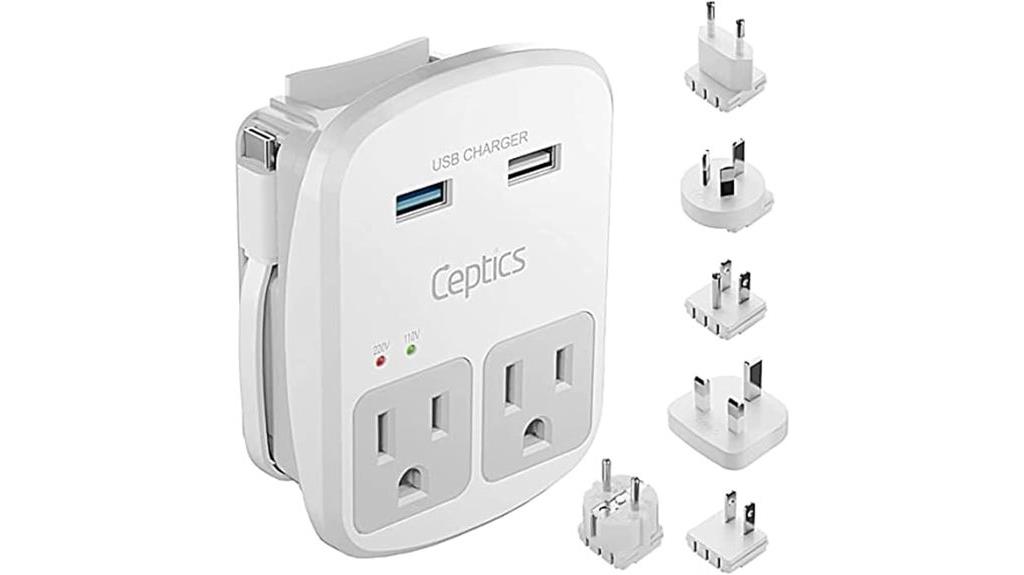Did you know that Ghana was the first sub-Saharan African country to gain independence from colonial rule? This pivotal moment in history has shaped Ghana into a beacon of African heritage and culture. As you plan your journey to this West African nation, you’ll find a wealth of sites that offer profound connections to the African diaspora. From the sobering remnants of the slave trade to vibrant markets bursting with local craftsmanship, Ghana’s must-see spots provide a transformative experience for Black travelers. But there’s more to this country than its well-known historical landmarks—you’ll soon discover hidden gems that will deepen your understanding of Ghana’s rich tapestry.
Cape Coast Castle
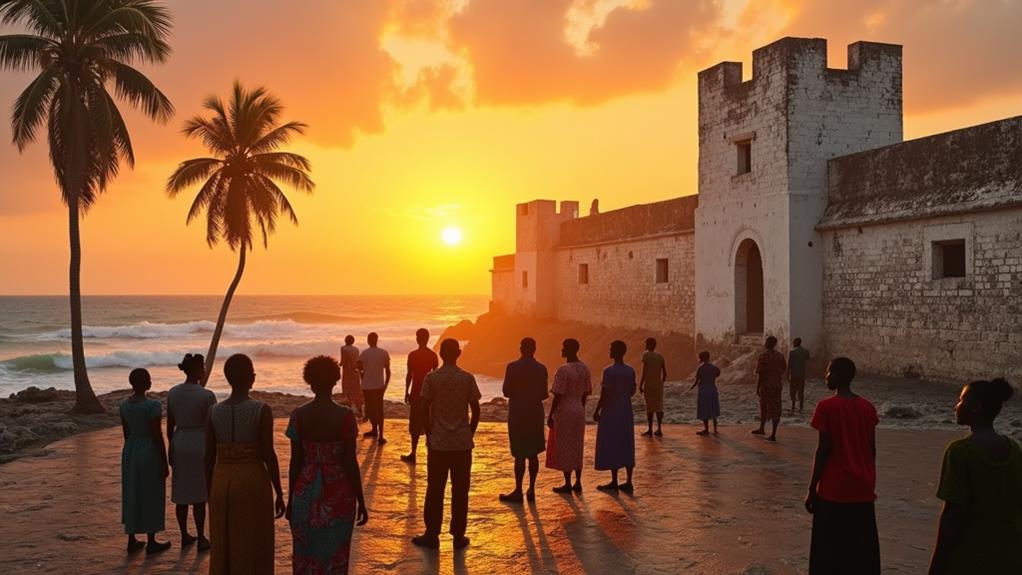
One of Ghana’s most significant historical sites, Cape Coast Castle stands as a powerful reminder of the transatlantic slave trade. As you approach this imposing white-washed fortress on Ghana’s coast, you’ll feel the weight of history pressing down on you.
Built in the 17th century by European traders, it served as a holding facility for enslaved Africans before their harrowing journey across the Atlantic.
You’ll walk through the same dungeons where countless men, women, and children were held in unimaginable conditions. The contrast between the dark, cramped cells and the airy quarters of the British officers above is stark and unsettling.
As you pass through the infamous “Door of No Return,” you’ll gain a visceral understanding of the final moments many Africans experienced on their ancestral soil.
The castle now houses a museum that offers in-depth information about the slave trade and its impact on Ghana and the wider African diaspora.
For many Black travelers, visiting Cape Coast Castle is an emotional pilgrimage, offering a chance to connect with their heritage and honor the resilience of their ancestors.
Elmina Castle
Just a stone’s throw from Cape Coast Castle, Elmina Castle offers another poignant glimpse into Ghana’s complex history. As you approach this UNESCO World Heritage site, you’ll be struck by its imposing white walls and strategic coastal location. Built in 1482 by the Portuguese, it’s the oldest European structure south of the Sahara.
During your visit, you’ll explore the castle’s dark past as a pivotal hub in the transatlantic slave trade. You’ll witness:
- The infamous “Door of No Return,” where captives were forced onto ships
- Cramped dungeons where enslaved Africans were held in inhumane conditions
- The governor’s quarters, showcasing the stark contrast between European luxury and African suffering
- The female slave dungeon, with its haunting reminders of gender-specific brutality
As you walk through Elmina’s halls, you’ll feel the weight of history and the resilience of those who endured its horrors.
The castle now serves as a powerful memorial and educational center, offering guided tours that provide essential context to Ghana’s past and its impact on the African diaspora.
Kwame Nkrumah Memorial Park
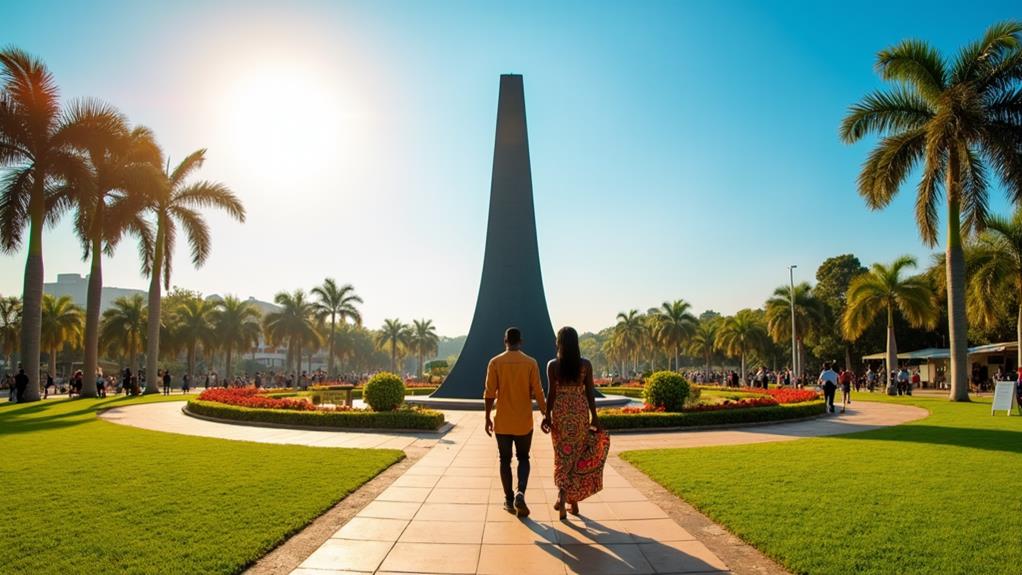
From the somber reflections of Ghana’s slave trade history, we shift to a celebration of its independence and visionary leadership. The Kwame Nkrumah Memorial Park in Accra stands as a tribute to Ghana’s first president and his pivotal role in achieving independence.
You’ll find the park nestled in the heart of the capital, where Nkrumah declared Ghana’s independence in 1957. The centerpiece is a striking bronze statue of Nkrumah, his arm outstretched, symbolizing his leadership in the pan-African movement. Surrounding the statue are water fountains that add a serene atmosphere to the grounds.
The park’s museum houses a collection of Nkrumah’s personal effects, photographs, and written works. You’ll gain insight into his life, political career, and philosophy of African unity.
Don’t miss the mausoleum where Nkrumah and his wife are buried, its design inspired by an upside-down sword, representing peace.
As you explore, you’ll encounter various sculptures and monuments that further illustrate Ghana’s struggle for independence and Nkrumah’s vision for a united Africa. The park serves as an educational and inspirational space, connecting visitors to Ghana’s proud history of self-determination.
Makola Market
After soaking in Ghana’s political history, it’s time to plunge into its vibrant commercial heart. Makola Market, located in the bustling center of Accra, is a must-visit destination for any traveler seeking an authentic Ghanaian experience. This sprawling marketplace is a sensory overload, filled with vibrant colors, aromatic spices, and the lively chatter of vendors and shoppers alike.
As you navigate the labyrinth of stalls, you’ll find an incredible array of goods:
- Traditional textiles, including kente cloth and colorful wax prints
- Fresh produce, from tropical fruits to local vegetables
- Handcrafted jewelry and accessories
- Authentic Ghanaian cuisine and street food
Don’t be afraid to haggle – it’s an expected part of the shopping experience. Engage with the friendly vendors, who are often enthusiastic to share stories about their products and culture.
Be prepared for the crowds and heat, but embrace the energy of this iconic market. It’s not just a place to shop; it’s a window into the daily lives of Accra’s residents and a reflection of Ghana’s vibrant commercial spirit.
Kakum National Park
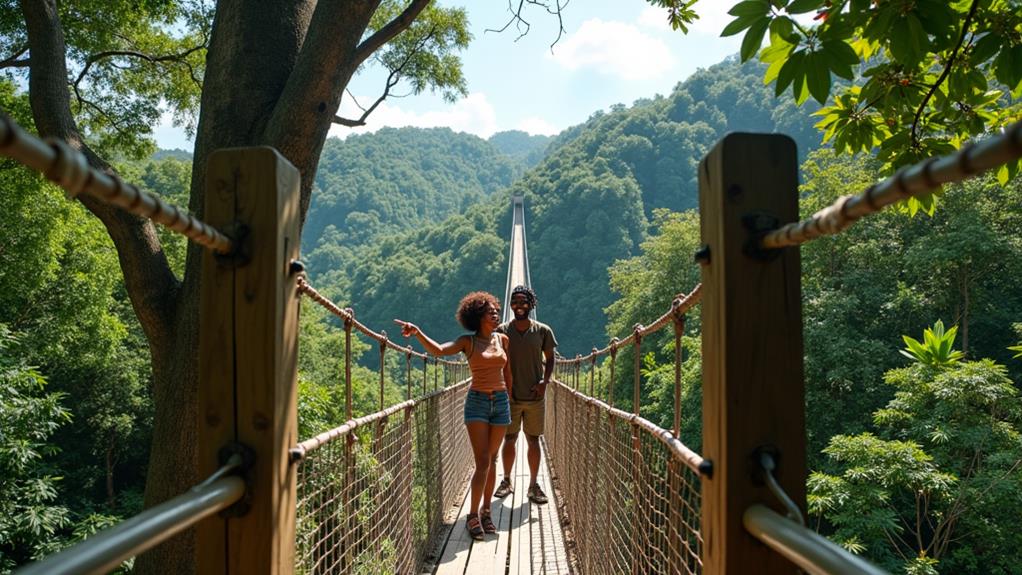
A natural wonderland awaits you at Kakum National Park, located in Ghana’s Central Region. This lush tropical rainforest spans 375 square kilometers and offers a unique blend of adventure and ecological education. You’ll find yourself immersed in a diverse ecosystem teeming with rare flora and fauna.
The park’s crown jewel is its famous canopy walkway, suspended 30 meters above the forest floor. As you traverse the 350-meter-long series of bridges, you’ll get a bird’s-eye view of the verdant canopy and might spot some of the park’s elusive wildlife. Keep your eyes peeled for forest elephants, leopards, and various monkey species.
For a more grounded experience, take guided nature walks through the park’s well-maintained trails. You’ll learn about traditional medicinal plants and the park’s conservation efforts. Birdwatchers will delight in the opportunity to spot some of the 266 bird species that call Kakum home.
To fully appreciate the park’s beauty, consider camping overnight. The serene atmosphere and chorus of nocturnal creatures provide a truly immersive experience.
Kakum National Park offers a perfect balance of adventure and natural wonder, making it a must-visit destination on your Ghanaian journey.
Jamestown Fishing Village
Step into the vibrant heart of Accra’s oldest district at Jamestown Fishing Village. This historic neighborhood offers a glimpse into Ghana’s coastal culture and colonial past. As you wander through the narrow streets, you’ll be immersed in the daily lives of local fishermen and their families.
Don’t miss these key attractions:
- Jamestown Lighthouse: Climb to the top for panoramic views of the Gulf of Guinea and Accra’s skyline.
- Brazilian House: Explore this well-preserved 19th-century building, showcasing the area’s Afro-Brazilian heritage.
- Boxing Gyms: Watch local fighters train in open-air gyms, a reflection of Jamestown’s boxing legacy.
- Fishing Harbor: Witness the bustling activity as fishermen bring in their daily catch and mend their nets.
As you explore, you’ll notice the colorful fishing boats lining the shore and the aroma of fresh seafood wafting through the air. Engage with friendly locals and learn about their traditions and challenges.
Jamestown’s mix of crumbling colonial architecture and vibrant street art tells a story of resilience and cultural pride. This authentic experience will deepen your connection to Ghana’s rich history and coastal way of life.
Assin Manso Slave River
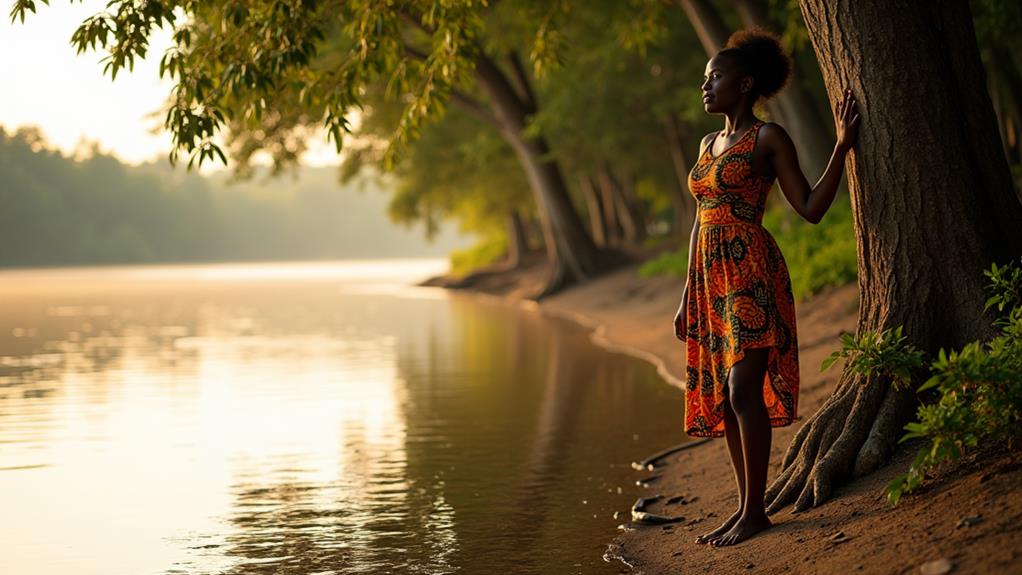
Deep within the lush forests of Ghana’s Central Region lies Assin Manso Slave River, a sobering reminder of the country’s painful past. This sacred site played a significant role in the transatlantic slave trade, serving as the final stop for enslaved Africans before their forced journey to the coast.
As you approach the river, you’ll notice its serene beauty, which stands in stark contrast to the atrocities that occurred here. Enslaved people were forced to bathe in these waters, enduring a final “cleansing” ritual before being sold and shipped across the Atlantic.
Today, the site serves as a powerful memorial and educational center. You can walk along the river’s edge, reflecting on the countless lives forever changed by this dark chapter in history.
The nearby Slave Market offers exhibits detailing the slave trade’s impact on Ghana and its people. Don’t miss the “Door of No Return” monument, symbolizing the point of departure for millions of Africans.
Visiting Assin Manso is an emotionally charged experience, but it’s essential for understanding Ghana’s complex history and honoring the resilience of its people.
W.E.B. Du Bois Center
From the somber reflections of Assin Manso, we shift our focus to celebrate one of Africa’s most influential intellectuals. The W.E.B. Du Bois Center in Accra stands as a tribute to the life and work of the renowned African American scholar and civil rights activist.
As you explore this significant site, you’ll gain insight into Du Bois’ connection to Ghana and his impact on Pan-Africanism. The center, located in the scholar’s former residence, houses a wealth of information and artifacts.
You’ll find:
- Du Bois’ personal library, containing over 3,000 volumes
- Original manuscripts and correspondence
- Photographs documenting his life and work
- A mausoleum where Du Bois and his wife are interred
As you wander through the exhibits, you’ll learn about Du Bois’ role in Ghana’s independence movement and his close relationship with the country’s first president, Kwame Nkrumah.
The center also hosts lectures and events, offering a deeper understanding of Du Bois’ legacy and its ongoing relevance in contemporary discussions of race and identity.
Kejetia Market
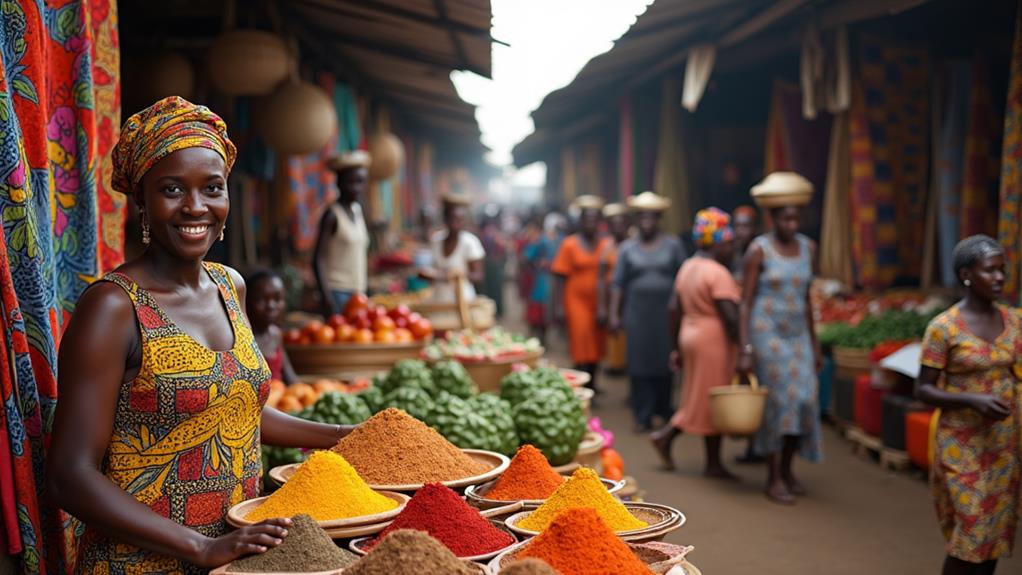
After immersing yourself in the intellectual legacy of W.E.B. Du Bois, it’s time to plunge into the bustling heart of Kumasi at Kejetia Market.
As one of the largest open-air markets in West Africa, Kejetia offers an unparalleled sensory experience that’ll connect you to Ghana’s vibrant culture and commerce.
You’ll find yourself surrounded by a maze of stalls, each overflowing with colorful textiles, handcrafted goods, and local produce. The market’s recently renovated structure houses over 10,000 stores, making it a one-stop shop for everything from traditional Kente cloth to modern electronics.
As you navigate the narrow aisles, you’ll encounter skilled artisans crafting intricate jewelry and friendly vendors enthusiastic to share stories about their wares.
Don’t miss the opportunity to sample local delicacies or haggle for unique souvenirs to take home.
Kejetia Market isn’t just a shopping destination; it’s a living, breathing symbol of Ghana’s economic spirit and cultural diversity.
Here, you’ll witness the daily rhythms of Ghanaian life and feel the pulse of a nation deeply rooted in trade and community.
Join The Discussion
What were your most memorable moments while exploring Ghana? Share your favorite destinations, travel tips, and cultural insights to inspire and connect with fellow travelers.
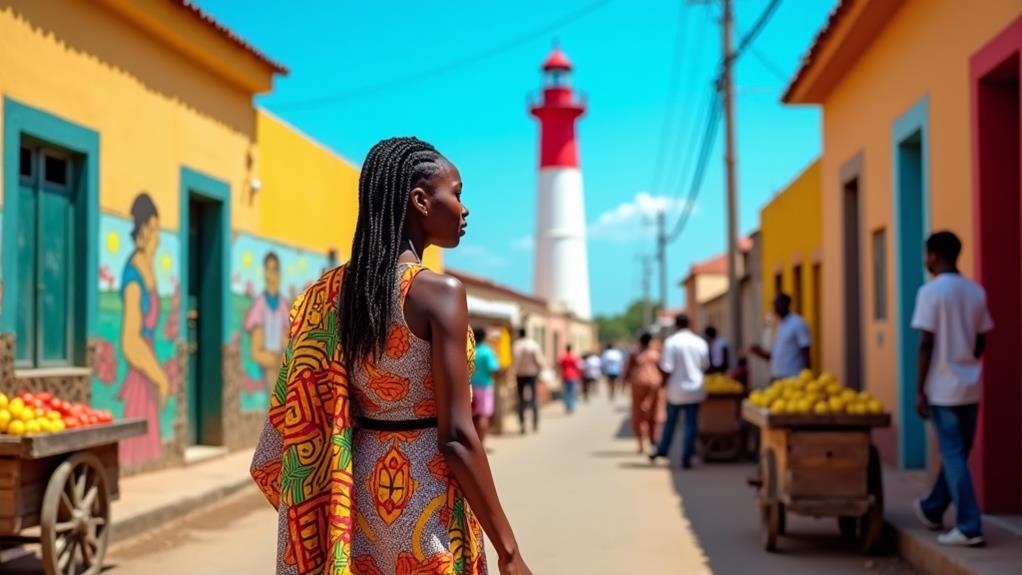
Embark on your journey to Ghana with essentials that celebrate culture, enhance your travel experience, and create lasting memories.



